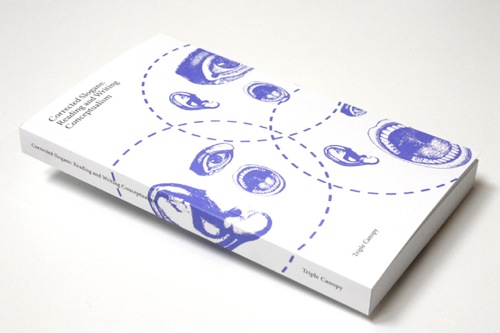The Poem Happens Elsewhere: Brooklyn Rail on Triple Canopy's Corrected Slogans

Courtney Fiske has devoted plenty of time to Corrected Slogans: Reading and Writing Conceptualism (Triple Canopy 2013), as evidenced by this review at the Brooklyn Rail. After giving us the gist, Fiske talks about the book itself, which rides the TC line in its form:
Founded in 2007, Triple Canopy tasks itself with “slowing down the Internet”: capturing the absorptive, tactile experience of reading in print while mining the web’s possibilities for interactive media. In an analogous way, Corrected Slogans’s copious annotations, which appear in purple on the left-hand side of each spread, serve to “slow down” the book. They're not quite footnotes—sidenotes seems more apt—and their function departs from that of a scholarly gloss, which serves strictly to cite and clarify. In its more peripheral usage, the footnote is the academic’s equivalent of a swagger: a way to show just how much you’ve read about a subject in ways that might otherwise confound writerly flow. Referencing Samuel Delany’s 1966 sci-fi stalwart Babel-17 in the same breath as an 1818 letter by John Keats, Corrected Slogans’s left-hand commentary retains some of this bluster while cleaving from the text at more oblique angles than pedantic exegesis would allow.
Though some notes explain the text, fleshing out an obscure reference or excerpting a primary source, others orbit around it, enabling a multiform view. The result is a book that makes room for its reader, encouraging the sort of loose, impressionistic connections that the best reading experiences conjure. A discussion of picture-based language links to filmmaker Stan VanDerBeek’s manifesto for an unfinished project, the Movie-Drome, 1963–66, a series of immersive domes whose kaleidoscopic constellations of images imparted information in the most universal form possible: pictures. Ariana Reines’s remark that no one reads Proust cover to cover—mentions of A la recherche serve more as a badge of intellectualism than evidence of 3,200 pages perused—directs to the novelist’s preface to his translation of art historian John Ruskin’s Bible of Amiens. “Ruskin’s thought is not like that of Emerson, for example, which is entirely contained in a book, that is to say, an abstract thing, a pure sign of itself,” Proust writes, summarizing, in effect, what his magnum opus has become.
Like its publisher, Corrected Slogans sidles curiously between print and digital. Its fastidious edits, a vestige, increasingly, of the printed page, lend it the feel of a dog-eared book, removed from the web’s frictionless slick. At the same time, it takes the footnote and subjects it to the logic of the Internet. Its annotations seem beholden to the sort of tangential wandering through sources that Google and its bevy of digitized books enable. Search for a phrase, and you’re bound to end up elsewhere, often in a topic only tenuously threaded to your initial query. Viewed through this frame, Corrected Slogans hypostatizes the web’s abstract flow, where every text yawns into another.
(Il)legibility of conceptual texts, visual art and avant-garde film's resistance to "being read," and other issues that come up in Corrected Slogans are also addressed. Read it all here, as we like to say.


